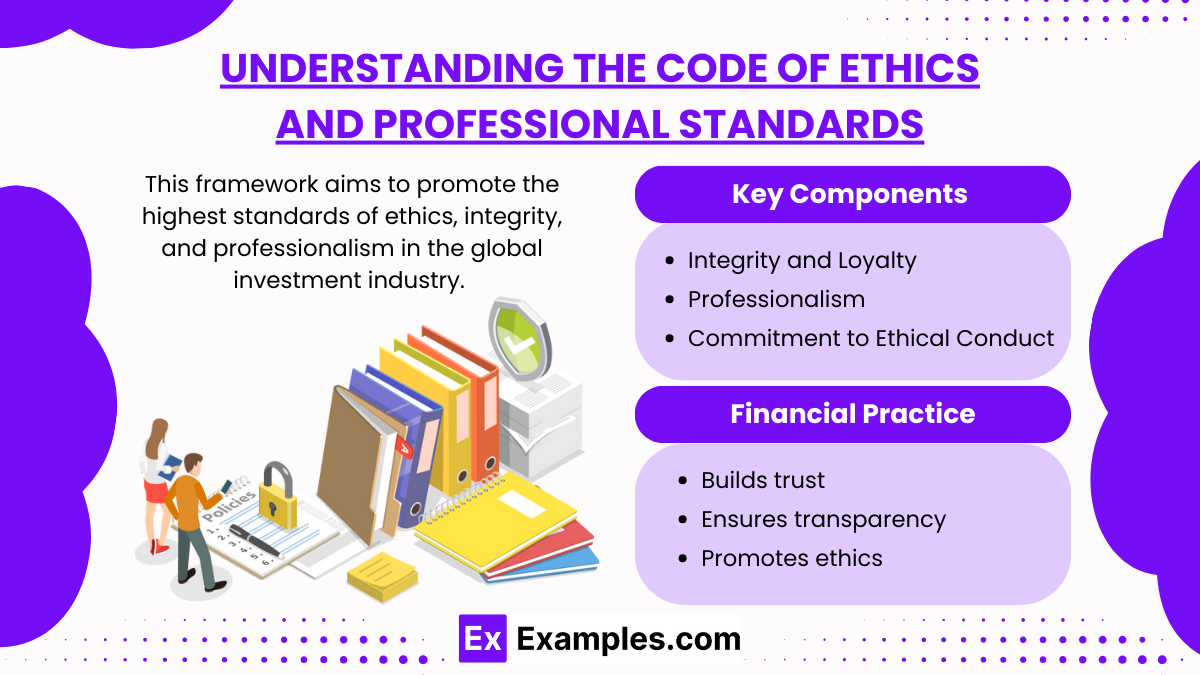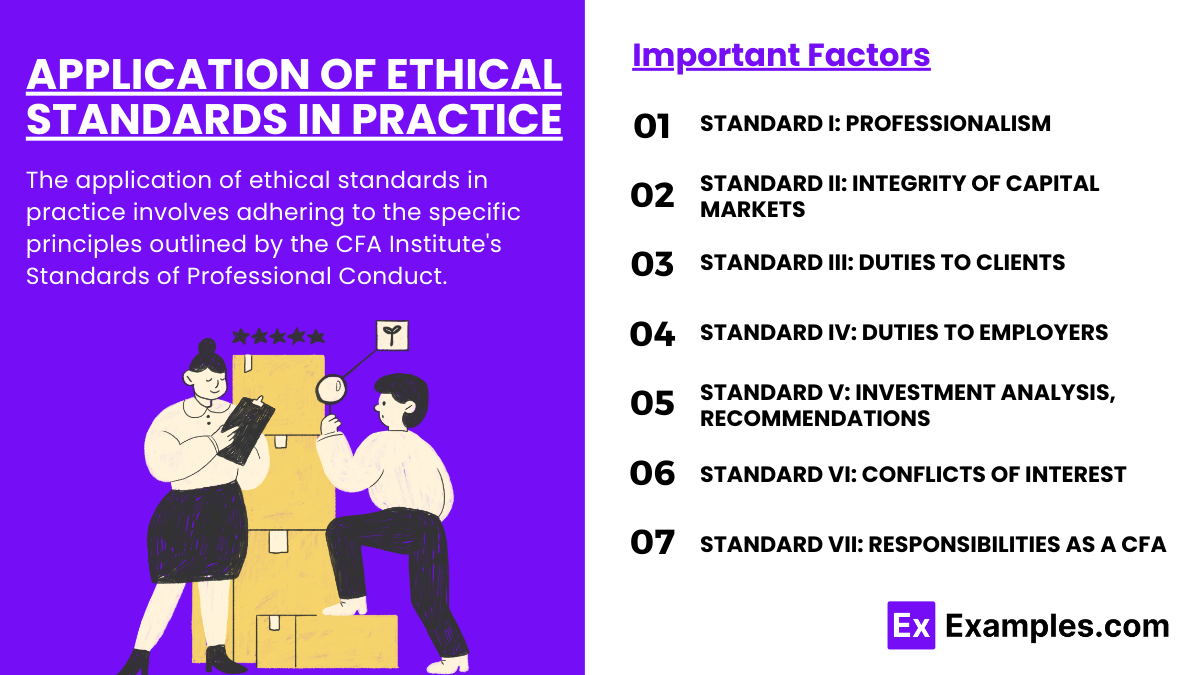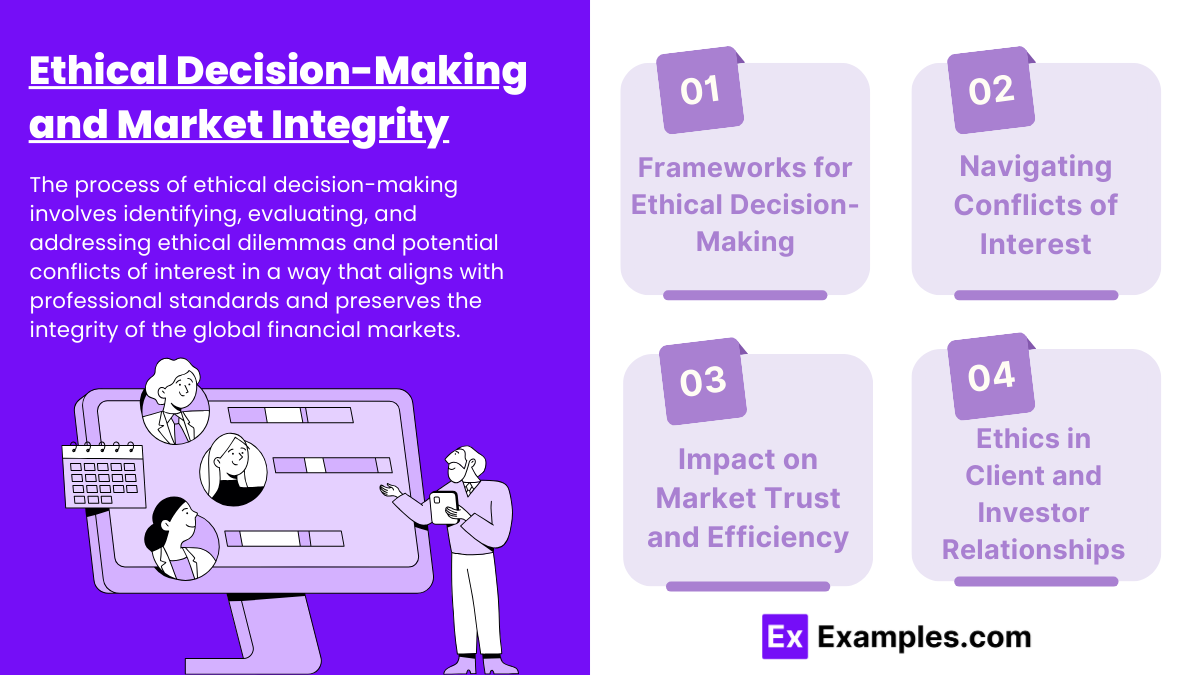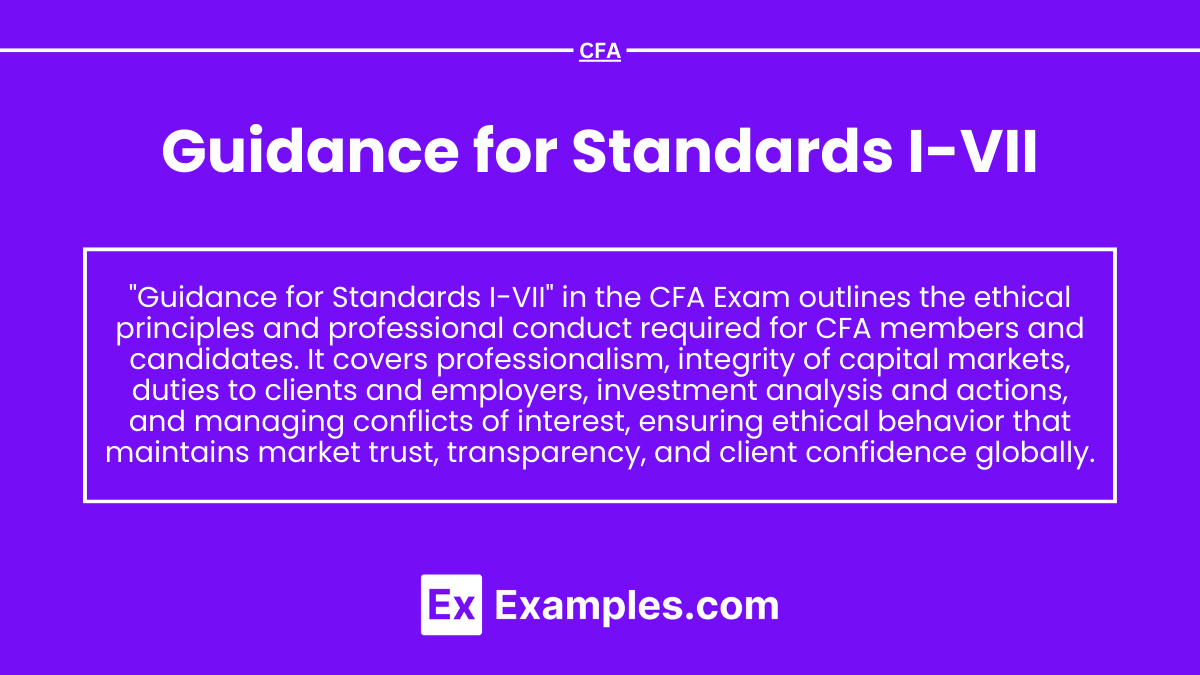Preparing for the CFA Exam requires a comprehensive understanding of Guidance for Standards I-VII, outlining ethical principles and professional responsibilities for CFA members. Mastery of topics such as professionalism, integrity of markets, duties to clients and employers, and managing conflicts of interest is essential. This ensures ethical conduct, client trust, and market confidence.
Learning Objective
In studying “Guidance for Standards I-VII” for the CFA Exam, you should understand the ethical principles and professional responsibilities guiding CFA charter holders, including professionalism, integrity of capital markets, and duties to clients and employers. Analyze the standards governing independence, objectivity, fair dealing, and conflict management. Evaluate how these principles apply to scenarios involving nonpublic information, client confidentiality, and performance reporting. Additionally, explore the practical implications for managing conflicts of interest, adhering to regulatory requirements, and building trust in client relationships through ethical conduct and transparent communication in CFA practice questions and case studies.
Understanding the Code of Ethics and Professional Standards

The CFA Institute Code of Ethics and Standards of Professional Conduct provide a fundamental framework that governs the behavior of CFA charterholders and candidates. This framework aims to promote the highest standards of ethics, integrity, and professionalism in the global investment industry. The Code emphasizes responsibilities to the investing public, integrity of financial markets, and ethical conduct that reinforces trust and confidence in financial professionals and institutions.
Key Components of the Code of Ethics:
- Integrity and Loyalty: CFA professionals must act with integrity, competence, diligence, and respect for the rights of all clients, placing the client’s interests ahead of their own.
- Professionalism: This encompasses the obligation to maintain and improve their professional competence, adhere to legal standards, and demonstrate sound judgment and objectivity.
- Commitment to Ethical Conduct: Members and candidates are bound to promote and maintain high standards of ethical behavior, which help build trust with clients and investors, ultimately supporting the credibility and transparency of financial markets.
The Standards of Professional Conduct are broken down into several specific standards that provide detailed guidance on expected behaviors and practices in key areas of professional responsibility. This includes topics such as duties to clients, duties to employers, fair dealing, and ensuring the integrity of capital markets. These standards not only reinforce ethical decision-making but also provide practical guidelines for managing ethical dilemmas and potential conflicts of interest.
Importance in Financial Practice: The guidance within the Code of Ethics and Standards serves to protect investors, ensure market efficiency, and maintain public confidence in financial markets. As a result, adhering to these principles is essential for CFA charterholders and candidates, helping them act as stewards of client interests and maintain their commitment to professionalism and ethical behavior.
Application of Ethical Standards in Practice

The application of ethical standards in practice involves adhering to the specific principles outlined by the CFA Institute’s Standards of Professional Conduct. These standards guide the behavior of CFA charterholders and candidates in various aspects of professional and client interactions, ensuring that ethical practices are upheld across the investment industry. Each standard has specific requirements that professionals must meet to maintain trust and integrity in their roles.
Standard I: Professionalism
- Knowledge of the Law: CFA professionals must understand and comply with all applicable laws, rules, and regulations of any government, regulatory organization, licensing agency, or professional association governing their professional activities. When conflicts arise between different laws, the stricter law applies.
- Independence and Objectivity: Professionals must exercise independence and objectivity in their professional activities, ensuring that their analyses, recommendations, and decision-making processes are free from undue influence or bias.
- Misrepresentation and Misconduct: Members must avoid making misrepresentations or engaging in dishonest conduct, including falsifying records, data manipulation, or other forms of professional misconduct.
Standard II: Integrity of Capital Markets
- Material Nonpublic Information: Members must not act or cause others to act on material nonpublic information that could affect the value of an investment. This ensures fairness in market transactions and prevents insider trading.
- Market Manipulation: Professionals must refrain from practices that distort prices or artificially influence trading volumes with the intent to deceive or mislead investors. This protects the integrity of market operations and fosters market confidence.
Standard III: Duties to Clients
- Loyalty, Prudence, and Care: Members must act with reasonable care and exercise prudent judgment, putting client interests above their own and maintaining a high level of diligence in managing client portfolios.
- Fair Dealing: Investment professionals must deal fairly with all clients when making investment recommendations, providing investment analyses, and engaging in any professional activity.
- Suitability: Professionals must understand the client’s financial situation, needs, and investment objectives to provide suitable recommendations. This includes conducting thorough analyses to ensure the investments are appropriate for the client’s goals and risk tolerance.
- Performance Presentation: Members must ensure the fair, accurate, and complete presentation of investment performance information.
- Preservation of Confidentiality: Professionals must maintain the confidentiality of client information unless disclosure is required by law or the client permits it.
Standard IV: Duties to Employers
- Loyalty: Members must act in the best interests of their employers and should not deprive their employers of the advantage of their skills or take advantage of confidential information.
- Additional Compensation Arrangements: Any compensation arrangements beyond those provided by the employer must be disclosed and approved to avoid conflicts of interest.
- Responsibilities of Supervisors: Supervisors have a responsibility to prevent and detect violations of laws, regulations, and the Code and Standards in their organizations. This includes ensuring proper compliance mechanisms are in place.
Standard V: Investment Analysis, Recommendations, and Actions
- Diligence and Reasonable Basis: Members must exercise diligence, independence, and thoroughness when analyzing investments, making recommendations, or taking actions. They must also have a reasonable basis for such activities based on comprehensive research.
- Communication with Clients and Prospective Clients: Clear and accurate communication is vital. Professionals must disclose the basic format and general principles of the investment processes they use.
- Record Retention: Records supporting investment analyses, recommendations, and actions must be maintained to ensure transparency and accountability.
Standard VI: Conflicts of Interest
- Disclosure of Conflicts: Members must disclose all matters that could reasonably be expected to impair their independence or objectivity or interfere with their duties to clients, prospective clients, and employers.
- Priority of Transactions: Transactions for clients and employers take precedence over transactions in which a member is the beneficial owner, thus preventing potential conflicts.
- Referral Fees: Any referral fees must be disclosed to clients and employers to ensure transparency.
Standard VII: Responsibilities as a CFA Institute Member or Candidate
- Conduct as Members and Candidates in the CFA Program: Members must adhere to the rules, policies, and professional standards of the CFA Program. This includes acting ethically and responsibly as they pursue the CFA designation.
- Reference to CFA Institute, CFA Designation, and CFA Program: Accurate representation of one’s CFA designation status and adherence to standards around its usage is essential.
Ethical Decision-Making and Market Integrity

Ethical decision-making and market integrity are at the core of the CFA Institute’s ethical standards. The process of ethical decision-making involves identifying, evaluating, and addressing ethical dilemmas and potential conflicts of interest in a way that aligns with professional standards and preserves the integrity of the global financial markets. Upholding market integrity means promoting transparency, trust, and fairness across all professional actions and financial transactions.
Frameworks for Ethical Decision-Making
- Identifying Ethical Issues: Professionals must first recognize and clearly define the ethical dilemma they face. This step is critical as it sets the foundation for a structured approach to resolving the issue.
- Evaluating the Situation: Members are required to assess relevant laws, regulations, and CFA Institute Standards of Professional Conduct that may apply to the scenario. They must consider the potential impact of their actions on various stakeholders, including clients, employers, and market participants.
- Exploring Alternative Actions: Investment professionals must consider a range of possible actions and evaluate the ethical implications and outcomes of each option. This ensures that the chosen action aligns with both professional ethics and the client’s best interests.
- Choosing the Most Ethical Course of Action: After weighing all options, professionals must select the course of action that best upholds ethical standards, integrity, and professionalism. This decision should prioritize transparency, fairness, and the protection of client interests.
- Documenting and Reflecting: Keeping records of ethical decisions and the rationale behind them helps ensure accountability and provides guidance for future actions. Reflection also helps professionals grow in ethical judgment and practice.
Navigating Conflicts of Interest
- Disclosure of Potential Conflicts: Identifying and fully disclosing potential conflicts of interest is essential to maintain objectivity and integrity. This transparency enables clients and employers to make informed decisions.
- Prioritizing Client Interests: Ethical decision-making requires members to always act in the best interests of their clients, even if it conflicts with their own financial interests or the interests of their firm.
- Managing Personal and Professional Boundaries: Ensuring that personal and professional interests do not overlap prevents biased decision-making and promotes market integrity.
Impact on Market Trust and Efficiency
- Fair and Transparent Practices: Ethical practices foster fair competition, protect against fraud and manipulation, and promote efficiency in capital markets. By adhering to ethical standards, CFA professionals contribute to a stable and transparent financial environment.
- Building Investor Confidence: Ethical conduct helps maintain investor trust, which is fundamental to the health and stability of financial markets. Clients and market participants are more likely to engage and invest when they trust the financial professionals and the processes they adhere to.
- Preventing Market Manipulation: Ethical decision-making guards against unethical practices, such as insider trading or market manipulation, which can distort prices and harm investor confidence. Upholding integrity ensures that markets operate with fairness and transparency.
Ethics in Client and Investor Relationships
- Transparency and Honesty: CFA members must be transparent in their communication with clients, ensuring accurate representation of investment strategies, risks, and performance.
- Confidentiality: Maintaining client confidentiality is essential, except when required by law to disclose information. This helps build trust and ensures that clients’ interests are protected.
- Diligence and Care: Acting with diligence and putting client interests first helps promote long-term client relationships and reinforces ethical practice.
Examples
Example 1: Knowledge of the Law (Professionalism)
A CFA charterholder works in a jurisdiction with less stringent insider trading regulations compared to international standards. Despite the local regulations allowing certain activities, the charterholder adheres to the stricter CFA Standards, refusing to trade on material nonpublic information, thereby maintaining ethical and legal compliance.
Example 2: Independence and Objectivity (Professionalism)
An analyst is offered an expensive gift by a vendor in exchange for a favorable recommendation on their company’s stock. The analyst declines the gift and discloses the offer to their compliance department, ensuring that their recommendations remain unbiased and free from potential conflicts of interest.
Example 3: Fair Dealing (Duties to Clients)
A portfolio manager develops a new investment recommendation and ensures that it is communicated to all clients simultaneously, regardless of their account size or status. This demonstrates adherence to the standard of fair dealing, providing equal access to information for all clients.
Example 4: Material Nonpublic Information (Integrity of Capital Markets)
A CFA candidate receives confidential information regarding a pending merger from a friend who works at the target company. The candidate refrains from trading on the information and takes measures to prevent others from acting on it, thereby upholding market integrity and ethical behavior.
Example 5: Disclosure of Conflicts (Conflicts of Interest)
A portfolio manager has a personal stake in a company that they are analyzing for potential inclusion in client portfolios. The manager discloses this conflict of interest to clients and their employer, ensuring full transparency and adherence to the standard on managing conflicts of interest.
Practice Questions
Question 1:
A CFA charterholder receives a gift from a client that could potentially influence their investment recommendations. What is the most appropriate course of action under the Standards of Professional Conduct?
A) Accept the gift without any disclosure
B) Reject the gift to maintain objectivity
C) Accept the gift and notify their employer
D) Accept the gift and provide preferential treatment
Answer: C) Accept the gift and notify their employer
Explanation:
Under the Standards of Professional Conduct, specifically regarding independence and objectivity, CFA members must disclose any gifts, benefits, or compensation that may influence their judgment to their employer. This ensures transparency and mitigates potential conflicts of interest. Simply rejecting the gift may be appropriate but is not mandated without consideration of company policy.
Question 2:
Which of the following is a violation of the CFA Standards concerning the integrity of capital markets?
A) Trading on publicly available information
B) Communicating a public company’s earnings forecast
C) Using confidential, nonpublic information for trading
D) Disclosing investment strategies to colleagues
Answer: C) Using confidential, nonpublic information for trading
Explanation:
The Standards prohibit acting on or encouraging others to act on material nonpublic information. Trading on such information constitutes insider trading and undermines market integrity. It is a serious violation that erodes public trust and market fairness.
Question 3:
A CFA member is developing a financial product that might compete with their employer’s product line. What is the ethical requirement under the Standards?
A) Proceed with the project without informing the employer
B) Cease all activities related to the new product
C) Disclose the conflict to the employer and seek permission
D) Avoid any related client contact
Answer: C) Disclose the conflict to the employer and seek permission
Explanation:
The Standards require that CFA members disclose potential conflicts of interest to their employer and seek approval before engaging in outside business activities that could compete with their employer’s interests. This ensures transparency, loyalty, and protection of both the member’s and the employer’s interests.


